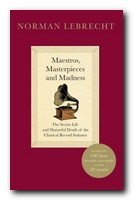Secret Life and Shameful Death of the Classical Record
Norman Lebrecht is a writer and pundit specialising in classical music who often appears on Radio 3 taking phone-in commentaries on what the BBC supposes to be very controversial topics such as “Should government subsidise the Arts?” and “Is the Internet taking over from print journalism?”. He comes across in the spoken word as a pushy and self-aggrandising windbag, but I must say that in Maestros, Masterpieces and Madness the same approach makes for lively reading.
 What he offers here is a history of recording classical music, from its faltering start at the beginning of the last century, to the present. His main argument is that what was at first perceived as a somewhat impure medium gradually took hold of the public imagination when the technology became affordable in the form of the LP record and then the CD. This led to an explosion of recording the classics which was fuelled by vainglorious recording companies and famous conductors alike. This accelerated until the whole system ground to a point of collapse brought on by their greed, by over-production, and a failure to see changes in mass media.
What he offers here is a history of recording classical music, from its faltering start at the beginning of the last century, to the present. His main argument is that what was at first perceived as a somewhat impure medium gradually took hold of the public imagination when the technology became affordable in the form of the LP record and then the CD. This led to an explosion of recording the classics which was fuelled by vainglorious recording companies and famous conductors alike. This accelerated until the whole system ground to a point of collapse brought on by their greed, by over-production, and a failure to see changes in mass media.
That’s the story in a nutshell, but it is told via a combination of detailed insider knowledge of how classical music works as a business, with celebrity vignettes, potted biographies, and what might be called lashings of The Higher Gossip.
Many of the principal conductors we think of as cultural icons and household names emerge from these pages as vain, self-seeking, and egotistical monsters – pocketing huge sums in secret deals behind the backs of their employers, and moving from one orchestra and city to another in a relentless search for more prestige.
This starts with figures such as the mercurial and dictatorial conductor Toscanini and the unscrupulous record producer Walter Legge, and then moves into more recent years with company takeovers which seem more motivated by whim and rivalry than any artistic or business logic.
He’s very well informed about all sorts of details. How Decca was a haven for gays (Britten, Tippett, Maxwell Davis) and how Deutsche Grammophon (owned by Siemens) had used slave labour from the death camps to keep its empire going.
The golden years are awash with lucrative record deals, and projects which replicate every popular classic known to man, ten times over. But then in the 1960s things begin to change. That’s because the record companies suddenly realise that they are making more money out of pop music.
By the end of 1956 Elvis had sold $22 million worth of discs and merchandise in the US, half as much as the whole of the classical market.
From this point onwards there was a struggle between pop and classical in the board rooms. One brought in the money, the other wasted it on a prodigious scale. Despite a temporary revival with early music, the end was in sight. And when it came there was lots of grief and pain for everyone. By the time we reach Internet downloads and Peer-2-Peer filesharing, the game is up.
You’ll love this story if you are interested in behind-the-scenes of the music world, and gossip about those people with high reputations but much lower levels of behaviour. It’s got schadenfreude by the bucketload. (Actually, that’s a fair example of Lebrecht’s style rubbing off on me.)
And yet for all his dirt-dishing on the famous, he actually supports a high patrician line of cultural conservatism. You get a strong sense of regret that things have turned out as they have. He doesn’t see the process he describes as one of change, fuelled by one technology after another, which probably has more people listening to classical music than ever before – as I am doing right now, over the Internet.
© Roy Johnson 2007
Norman Lebrecht, Maestros, Masterpieces and Madness, London: Allen Lane, 2007, pp.324, ISBN: 0713999570
More on music
More on media
More on lifestyle